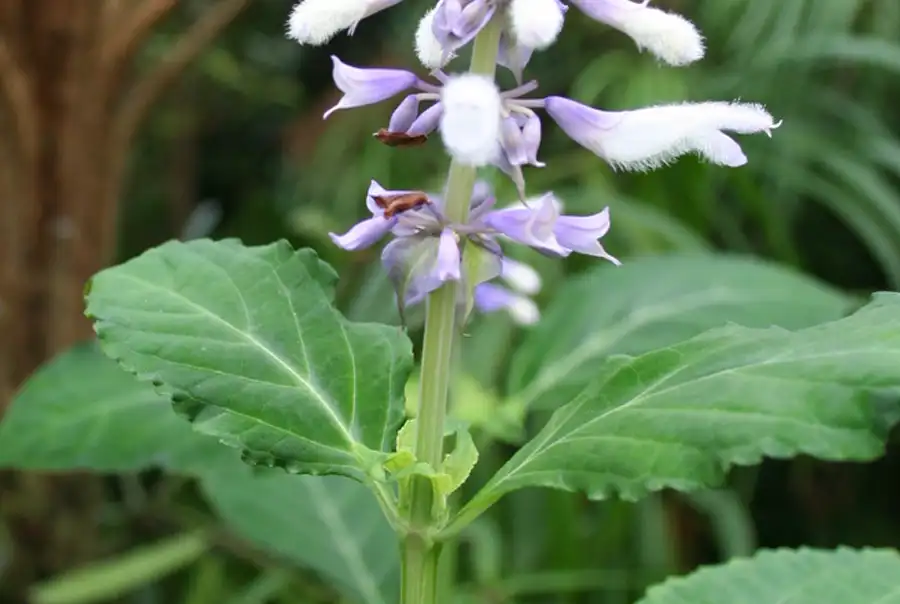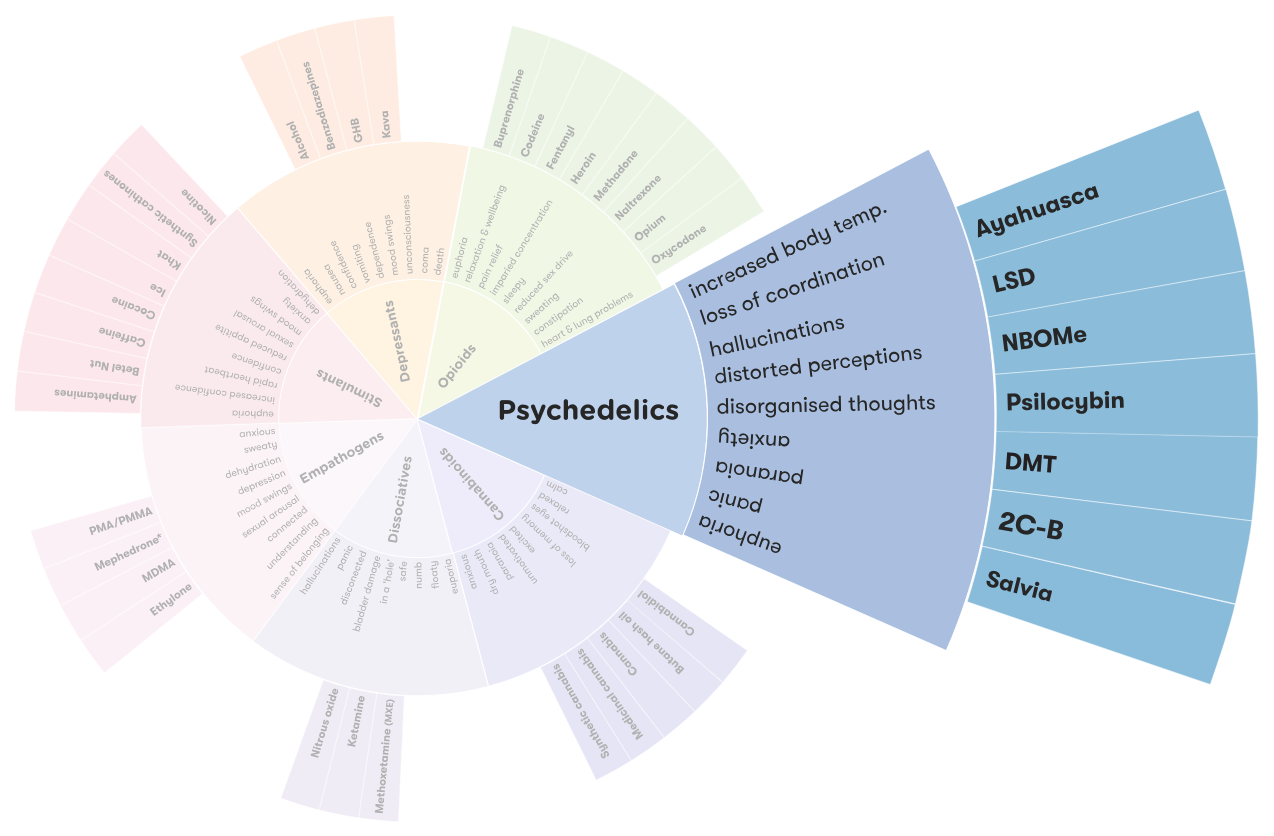How is salvia used?
The fresh leaves are held under the tongue (also called sublingual absorption) and the dried leaves are smoked in a bong or mixed with tobacco and smoked as a cigarette. Salvia is also used as a tincture or tea and in some countries, commercially extracted products are available.3
Effects of salvia
Use of any drug can have risks. It’s important to be careful when taking any type of drug.
Psychedelics affect everyone differently, based on:
- size, weight and health
- whether the person is used to taking it
- whether other drugs are taken around the same time
- the amount taken
- the strength of the drug (varies from batch to batch)
- environment (where the drug is taken).
Effects of salvia may include:
- anxiety
- amnesia
- short but intense hallucinations
- loss of energy (higher doses can cause sedation)
- pain relief
- confusion
- delusion
- feelings of impending doom
- increased appreciation of music
- uncontrolled body movements
- changes in visual perception
- laughter
- detached from the body
- restlessness
- increased body temperature
- time distortion.3, 4
According to anecdotal user reports, when smoked the effects of salvia begin in 15 to 60 seconds and last for about 15 to 90 minutes.3
When placed under the tongue, the effects begin in around 10 to 20 minutes and last for about 30 to 90 minutes.3
Impact of mood and environment
Drugs that affect a person’s mental state (psychoactive drugs) can also have varied effects depending on a person’s mood (often called the ‘set’) or the environment they are in (the ‘setting’):
Set is a person’s state of mind, previous encounters with psychedelic drugs, and expectations of what’s going to happen. For example, feelings of stress or anxiety before using salvia may result in an unpleasant experience (bad trip).5
Setting is the environment in which someone consumes a psychedelic drug – whether it’s known and familiar, who they’re with, if they’re indoors or outdoors, the type of music and light. For example, using salvia in a calm, quiet and relaxed environment can lead to, or contribute to, a pleasant experience but being in a noisy, crowded place may result in a negative experience.5
Being in a good state of mind, with trusted friends and a safe environment before taking salvia reduces the risk of having a ‘bad’ trip.
Overdose
To date there have been no reported deaths from salvia but as salvia impairs thoughts and emotions, it can cause loss of contact with external reality, leading to impaired judgement and risk taking.6, 7
Coming down
When smoked the after-effects can last approximately 15 to 60 minutes. When placed under the tongue, the after-effects may last around 30 to 120 minutes.3
Long-term effects
The long term effects of salvia haven’t been studied enough to understand what the risks might be.8
Salvia and mental health
People with a family history of mental illness are more likely to experience anxiety or paranoia after using salvia. This is in line with what the evidence tells us about people with mental illness and psychedelic use.9
Bad trips
Some people may have negative experiences taking psychedelics, or experiences they find challenging. This can include:
- frightening or confronting hallucinations
- intense anxiety or confusion
- fear and paranoia.5, 10
Tolerance and dependence
Similar to other psychedelics, salvia does not produce dependence. The desire to use salvia can decrease with use.3
Reducing harm
- Start with a lower dose so you know how it affects you. It’s going to affect each person differently because of differences in weight, tolerance and metabolism.
- Consider the type of experience you would like. Chewing the leaves produces a milder trip as opposed to smoking which can produce a much more intense experience.
- Consider the impact of mood and environment.
- Consider having a person to ‘trip sit’. A person who remains sober and can help out if needed.3, 11
Saliva and the law
Salvia is a schedule 9 drug and use of salvia is against the law. Federal and state laws provide penalties for possessing, using, making, selling, importing or exporting, or driving under the influence of salvia.12
Getting help
If your use of salvia is affecting your health, family, relationships, work, school, financial or other life situations, or you’re concerned about a loved one, you can find help and support.
Call the National Alcohol and Other Drug Hotline on 1800 250 015 for free and confidential advice, information and counselling about alcohol and other drugs
Help and Support Services search
Find a service in your local area from our list. Simply add your location or postcode and filter by service type to quickly discover help near you.
If you're looking for other information or support options, send us an email at druginfo@adf.org.au
Path2Help
Not sure what you are looking for? Try our intuitive Path2Help tool and be matched with support information and services tailored to you.
Find out more
- Nichols D. Psychedelics. Pharmacological Reviews 2016;68:264–355.
- European Monitoring Centre for Drugs and Drug Addiction. Salvia divinorum drug profile Portugal n.d.
- Psychonaut Wiki. Salvinorin A 2022 15.07.2022.
- Lange JE, Daniel J, Homer K, Reed MB, Clapp JD. Salvia divinorum: effects and use among YouTube users. 2010;108(1-2).
- Nutt D. Drugs without the hot air : making sense of legal and illegal drugs. Cambridge: UIT Cambridge Ltd; 2012.
- Canadian Government. Salvia [cited 2022 August ].
- System CPC. Salvia Divinorum 2016 [cited 2022 August].
- Kelly B. Legally Tripping: A Qualitative Profile of Salvia Divinorum Use Among Young Adults. Journal of Psychoactive Drugs 2011;43(1).
- Krebs T Johansen P. Psychedelics and Mental Health: A Population Study. PLoS One. 2013;8(8).
- Brands B, Sproule B, Marshman J, Ontario. Addiction Research F. Drugs & drug abuse : a reference text. Toronto, Ont.: Addiction Research Foundation; 1998 [cited 2021 May].
- Drug Science. Salvia n.d. [cited 2022 August].
- DRUGS, POISONS AND CONTROLLED SUBSTANCES ACT 1981 - SECT 36B, (n.d.).

